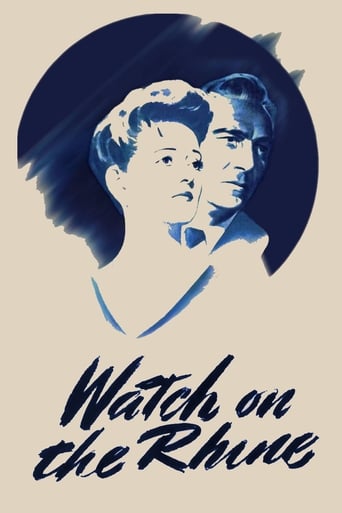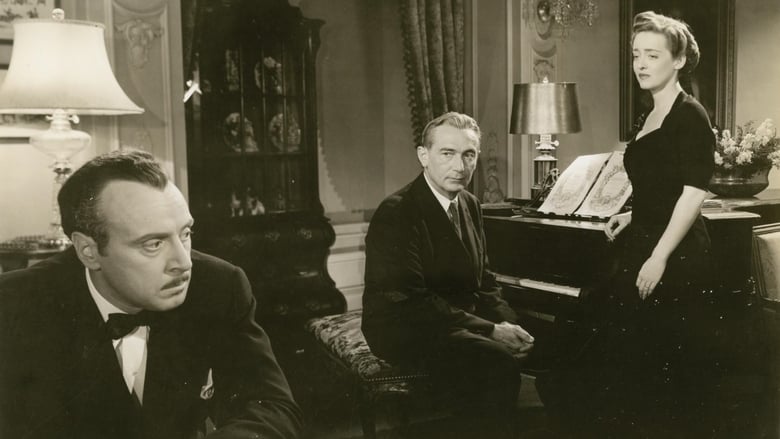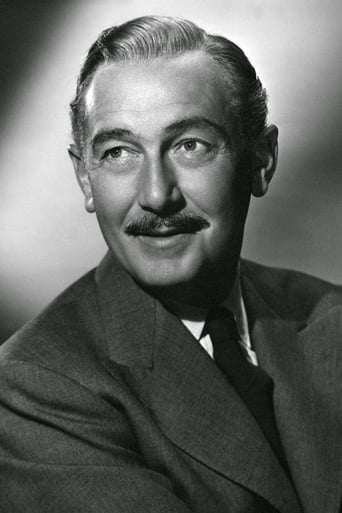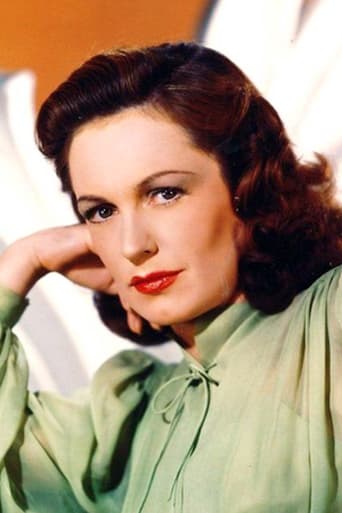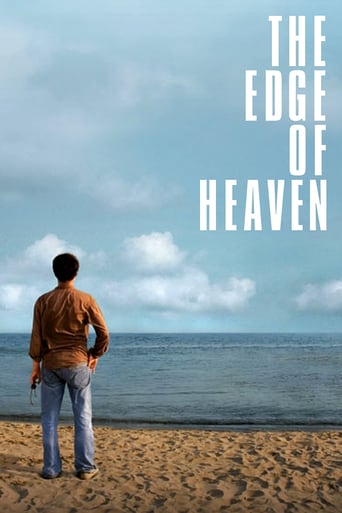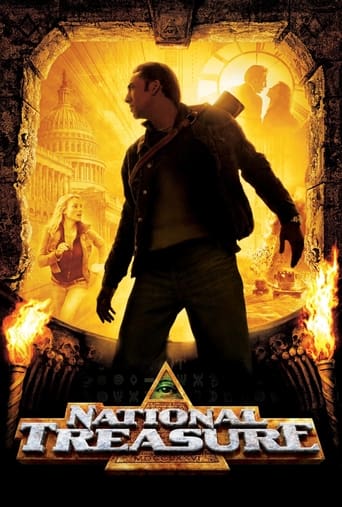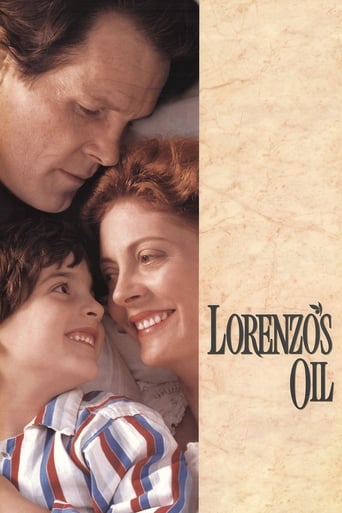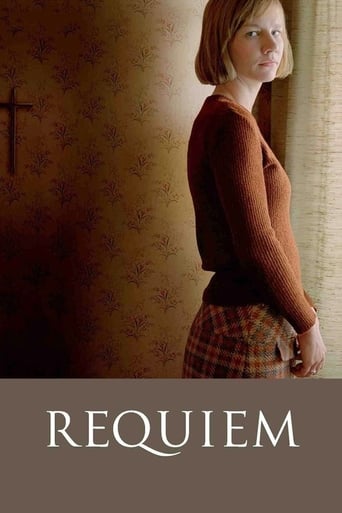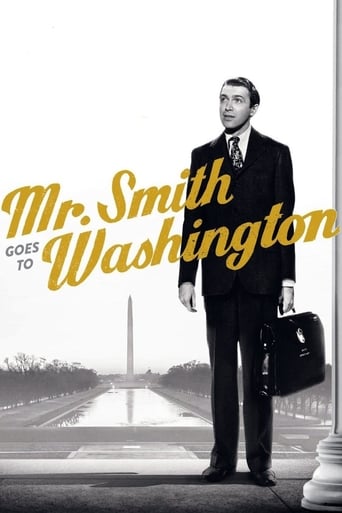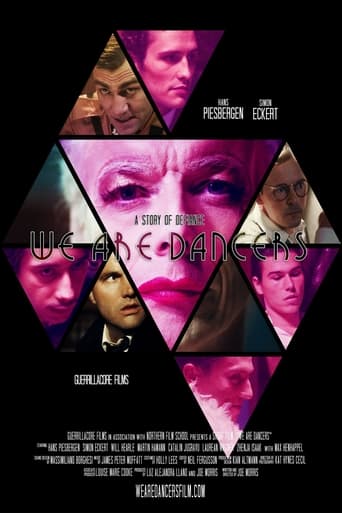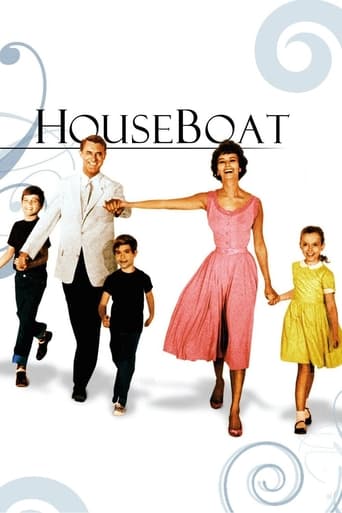Watch on the Rhine (1943)
On the eve of World War II, the German Kurt Müller, his American-born wife Sara, and their three children, having lived in Europe for years, visit Sara's wealthy mother near Washington, DC. Kurt secretly works for the anti-Nazi resistance. A visiting Romanian count, becoming aware of this, seeks to blackmail him.
Watch Trailer
Cast


Similar titles
Reviews
The stage play opened on Broadway in April 1941 and closed after 378 perfor¬mances on 21 February 1942. It starred Paul Lukas, Mady Christians and Lucile Watson. Here's where I and contemporary critics part company. Watch on the Rhine undoubtedly had an effective message for early 1940's America, but that message is now way out of date. In any event, nothing can disguise the play's many obvious shortcomings: Instant information preaching from characters who are no more than walking puppets, mouthing pretentious platitudes; situations that are pure soap opera; and, above all, dullness. The only piece of action in the entire play (and the film) occurs offstage. In this movie version, no attempt whatever is made to handle the proceedings cinematically. Herman Shumlin's direction is incredibly old-fashioned, with the players studiously hitting their marks and rattling off their lines. The groupings are stage groupings, with the actors standing around, stock still, while waiting for their cues to bring them to life. In my opinion, Lukas did not deserve his Academy Award (which should have gone to Bogart for Casablanca), but Lucile Watson should have defeated Katina Paxinou. Only Miss Watson (who admittedly has the most interesting character and dialogue) can fully overcome the play's dated propaganda, though George Coulouris makes a good stab at the impossible role in which he is miscast (he is able to convey the seedier aspects of de Brancovis effectively, but misses out on the charm). Donald Woods is ridiculously gauche (though few players would have fared better with such a part). Davis and Fitzgerald act in the somewhat overblown style then fashionable on the contemporary stage.
It's easy to watch Watch on the Rhine (1943) as a call to America to acknowledge the danger of Naziism. That's loud and clear -- and very moving. But it functions as a historic document in its astonishing limitation, as well. Even as it extolls America's embrace of freedom on the world stage it portrays without irony or questioning America's own moral problem, the inheritance of slavery and its inherent dehumanization of its own people. While the heroes fight fascism abroad the film implicitly countenances the fascism of racism in America. Dashiell Hammett wrote the screenplay, based on his romantic and writing partner Lillian Hellman's Broadway success, with her additional scenes and dialogue. Both were bright, liberal minds, sensitive writers, committed to the ideals of American democracy and militant defenders of humanity against the Nazis. Yet despite those credentials, they set the Bette Davis's family home on a plush plantation a drive away from Washington. The family has black servants whom the matriarch orders around imperiously. If there's any liberalism in the writers' view of these blacks it's restricted to a bit of eye-rolling sass. Otherwise the blacks here are simply the plantation stereotype -- especially the two wide-eyed mutes brought from the garden to shuffle the sofa. The servants have no exchange with the Davis heroine or the Paul Lucas saintly hero. When this film was made America's liberal intelligentsia had apparently not yet recognized the injustice of its racism. That's this film's real statement to us now. Like Hellman and Hammett we may think we've achieved a state of moral awareness and courage - - but what blinkers might we be wearing unawares today? For that we have to wake for future artists and critics to expose us. For more see www.yacowar.blogspot.com.
The is a great movie. The passage of time has not lessened its dramatic impact. Although set during World War Two, this movie, which is an excellent adaptation of the Lillian Hellman play, deal with themes which are relevant today and would resonate with a contemporary audience. Paul Lukas's performance is tremendous; his Academy Award is well-deserved. As for Bette Davis, she successfully tackles a role that was not a typical one for her. Here she is cast in a supporting role, yet she still stars, so good is her performance. The other member of the cast are also excellent. Special mention must go to George Coulouris and Irene Watson, both of whom have key roles in the drama. This movie conveys the feeling of determination and commitment to the struggle against Nazism, yet avoids becoming a polemic, which is why the movie is so strong as a drama. For anyone who likes strong stories and excellent acting, this movie is for you.
Based on a Lillian Hellman play (adapted by Dashiell Hammett), this film concerns Paul Lukas and wife Bette Davis coming to live with Davis' mother (Lucile Watson) in Washington, D.C. after running away from the trouble in Europe (the film is set in 1940). Watson is fond of houseguests, and one of them, George Coulouris, is a Romanian with Nazi sympathies. Coulouris soon discovers Lukas' true identity as a fighter with the resistance, which makes trouble. This movie is okay. It builds a bit too slowly and goes on a bit too long. When it gets to the good stuff, though, it is quite good. Davis in particular is in fine form. Lukas won an Oscar. Probably undeserved, as he beat out Bogie in Casablanca, but he's got a few great scenes. Hated Watson, who was also nominated. She's annoying. Also despised Lukas' little robo-children. Two boys and a girl - the girl doesn't say a single word in the film, I do believe, but the two boys rattle on and on and are God awful actors, particularly the younger one, Eric Roberts (not...THAT Eric Roberts! I don't think...). The character's name is Bodo, and if that isn't enough to make you want to punch him in the face, wait until he speaks!

